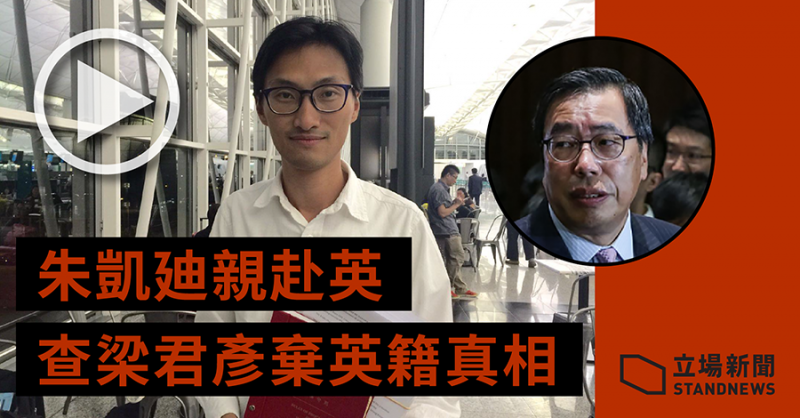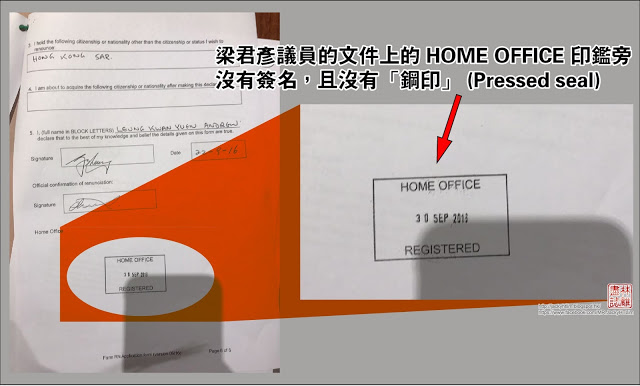
Hong Kong law maker Chu Hoi Dick has flown to London to confront the British Home Office concerning its alleged favoritism in processing pro-Beijing lawmaker Andrew Leung's nationality renunciation. Photo from Standnews. Non-commercial use.
In Hong Kong, lawmakers from the city's pro-democracy and pro-Beijing camps have been competing over the last few weeks for the presidency of the Legislative Council following elections in September. The pro-Beijing camp has the majority in the Legislative Council, and pro-Beijing legislator Andrew Leung Kwan-yuen eventually won the position.
But it was a victory steeped in controversy because of Leung's British nationality, which he managed to renounce in a short amount of time, leading some opposition lawmakers to speculate that the UK government unfairly prioritized his case.
According to Hong Kong’s constitution, called the Basic Law, only 20% of the legislative councilors can hold foreign passports. The legislature is divided between seats directly elected by the people and seats elected by professional or special interest groups, called functional constituencies, and Legislative Council election law only grants 12 functional constituency seats the privilege to retain foreign nationality. All candidates who decide to contest a seat in the Legislative Council have to declare their nationalities, and those who are not in the 12 designated functional constituencies have to give up their foreign passports in order to run for the election.
Leung represents the industrial functional constituency, and his seat is one of those 12 functional constituencies. But the president of the Legislative Council isn't allowed to have a foreign passport, meaning Leung had to renounce his UK citizenship — and fast.
He remained a British national until September 30 as indicated in a copy of the Application to renounce British citizenship, or Form RN, presented to the Legislative Council during the presidential election on October 12. According to the copy, the application date was September 22 and the declaration was signed and stamped by the UK's Home Office on September 30.
A blogger, Jacky Lim, raised a series of questions concerning Leung's Form RN:
經過多番考證,Form RN 嘅 Processing time 一般要12-14週,有記錄的最快最快都接近六星期,先會收到HOME OFFICE 寄回確認文件。那麼點解梁君彥可以前後9日 (9月22日-9月30日) 就可以完成手續?
I have checked with a number of sources, and the processing time for Form RN generally takes 12-14 weeks. The fastest record is nearly six weeks, before the applicant received confirmation from the Home Office. How come Andrew Leung can finish everything in nine days (September 22 to September 30)?
HOME OFFICE 要收申請表正本連同本護照,即係一定要寄過去。梁君彥响9月22日填表,假設用DHL或UPS或FedEx或特快專遞,都要最快9月23日中午先至去到HOME OFFICE,再經內部傳遞去到負責嘅職員手上。不過9月23日係星期五,即係職員最快响9月26日朝早返工先開始處理梁君彥個申請。[…] 四日時間就能完成 Form RN 審核,實在太匪夷所思!
According to requirements, the application form and the passport have to be sent to the Home Office together. Andrew Leung filled out his form on September 22. If he used express mail like DHL or FedEx, the set of documents could only be delivered to the Home Office around mid-day on the 23rd at the earliest. Then it had to go through internal mailing before it was delivered to the processing staff. But September 23 was a Friday, which means the staff could only handle the application on the morning of September 26 at the earliest…the processing of Form RN in four working days [in reality, it's five working days as the copy was stamped on September 30] is too incredible.
暫撇除「四日Processing time」嘅疑團。如果跟足程序,HOME OFFICE 應該是在9月30日pack 好晒啲文件然後寄DHL 嚟香港 […] 10月1 – 2日是星期六、日,10月3日就會派件去到梁君彥手上。而立法會主席提名期Deadline 是10月5日。即是話佢根本有足夠時間公開披露份Form RN,唔駛搞到依家咁大件事。點解當日唔Show 出嚟呢? 又或者,既然照計文件正本已經到手,點解要响10月12日先至突然間話收到呢封信,仲要只係「影印本」?
Putting aside the four days’ processing time issue. The Home Office should have had all the documents ready and shipped back to Hong Kong on September 30. […] Given that October 1 and 2 were a Saturday and Sunday, Andrew Leung should have received the package by October 3. The deadline for the nomination for Legislative Council president was on October 5, he should have been able to present the Form RN and save all the trouble. But he did not show the form? If he had the original on hand, why did he suddenly declare that he received a copied version of the Form RN?
英國內政部對於國籍申請從來都非常嚴謹。內政部基於乜嘢理據特事特辦到將梁君彥嘅退籍申請審核時間濃縮最少10倍?
梁君彥响提交Form RN 時有無夾附一份信件說明來由? 如果有而假設信件內容提到就係「因為要參選立法會主席」,HOME OFFICE 係咪可以視之為合理理據加快審批,我是非常懷疑。又假設HOME OFFICE 真係接納,即是變相英國政府介入香港政治?! 中共唔係成日話「不得外國干涉中國內政」嘅咩? 梁君彥「勾結外國勢力介入『中國內政』[…]
The British Home Office is rather careful in handling nationality matters. Under what circumstances did the Home Office decide to provide special treatment to Andrew Leung and speed up the processing time to 10 times faster than usual?
When Andrew Leung submitted his Form RN, did he also attach an explanation? If the explanation was just that he had to “run for the Legislative Council presidency” I doubt if the Home Office would consider that justifying the privileged express processing procedure. If we assume that the Home Office really accepted the explanation, does that mean the British government was directly intervening into Hong Kong political affairs? The Chinese Communist Party keeps saying that foreign powers should not intervene into China’s domestic affairs, Andrew Leung’s act can be viewed as hooking up with a foreign power to intervene into Chinese internal business…
Since Andrew Leung has refused to answer questions about the process, newly elected lawmaker Chu Hoi Dick departed to London on October 16 to follow up on the matter. He pointed out in a press statement that if the British government had indeed given Leung special treatment under pressure from Beijing, that would be a violation of the “Hong Kong people ruling Hong Kong” principle in the Sino-British Joint Declaration between China and the UK, which handed control of former British colony Hong Kong back to China in 1997. That declaration stipulated that Hong Kong would retain its previous capitalist system and its way of life for the next 50 years:
我們認為,保守黨政府在北京的壓力下,以極端效率和不正常行政手段,以確保梁君彥能夠及時處理國籍放棄手續,實質上地介入香港立法機關的主席選舉,影響香港立法機關的自主,甚至違反關乎《中英聯合聲明》中港人治港的基本承諾
We believe that the British Government, under the Conservative Party, experienced pressure from Beijing when processing Andrew Leung's application to renounce his British nationality given its extremely efficient and extraordinary administration procedures in order to make sure that he managed to renounce his nationality on time. This is a substantial intervention in the Legislative Council president election in Hong Kong and will affect the autonomy of the law-making body. Such an act has violated the promise of “Hong Kong people ruling Hong Kong” under the “Sino-British Joint Declaration”.
The question of his British nationality aside, the choice of Leung for Legislative Council president was controversial for other reasons. Leung's functional constituency only has 543 registered voters, whereas other pro-Beijing lawmakers have more of a popular mandate. Michael Tien Puk-sun and Paul Tse Wai-chun both were elected directly with tens of thousand votes from their districts and expressed interest in running for the legislative presidency, but Beijing’s representative in Hong Kong, the China Liaison Office, preferred Leung, who has the mainland government's blessing and has been a lawmaker representing the industrial sector since 2004.







